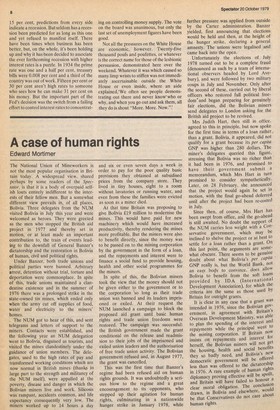further pressure was applied from outside by the Carter administration.
Banzer yielded, first announcing that elections would be held and then, at the height of the hunger strike, declaring a general amnesty. The unions were legalised and came back into the open.
Unfortunately the elections of. July 1978 turned out to be a complete fraud (denounced as such by a team of international observers headed by Lord Avebury), and were followed by two military coups in July and November. Only after the second of these, carried out by liberal officers who restored full political freedom' and began preparing for genuinely fair elections, did the Bolivian miners send delegates to London asking for the British aid project to be revived.
Mrs Judith Hart, then still in office, agreed to this in principle, but now spoke for the first time in terms of a loan rather , than a grant. Bolivia, it appeared,, did not qualify for a grant because its per capita GNP was higher than 280 dollars. The miner's delegates queried this figure, stressing that Bolivia was no richer than it had been in 1976, and promised to have their government submit a memorandum, which Mrs Hart in turn promised to consider sympathetically. Later, on 28 February, she announced that the project would again be set in motion, with the final go-ahead deferred until after the project had been re-costed in July. Since then, of course, Mrs Hart has been swept from office, arid the go-ahead is still awaited. No doubt the support of the NUM carries less weight with a Conservative government, which may be inclined to shelve the project or at best to settle for a loan rather than a grant. On this last point, the arguments are somewhat obscure. There seems to be genuine doubt about what Bolivia's per capita GNP really is, but the World Bank, not an easy body to convince,' does allow Bolivia to benefit from the soft loans provided by IDA (International Development Association), for which the criteria are the same as those used by Britain for outright grants. It is clear in any case that a grant was intended in 1976, since the Bolivian go'' , ernment, in agreement with Britain s Overseas Development Ministry, was able to plan the spending of the interest and repayments while the principal went to the mining corporation. If Britain now insists on repayments and interest for herself, the Bolivian miners will not get the housing, health and social benefits they so badly need, and Bolivia's new democratic government will be offered less than was offered to the dictatorship in 1976. A rare example of human rights diplomacy proving effective will be spoilt, and Britain will have failed to honour a clear moral obligation. The conclusion drawn, in Bolivia and elsewhere, would be that Conservatives do not care about human rights.






































 Previous page
Previous page